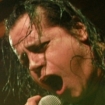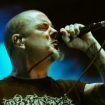The world first got to know Philip H. Anselmo as a work in progress, inspired and enraged, prepared to either rise above or crash into the abyss. As the explosive, wild-eyed frontman for Pantera, he was a central force in one of the most essential metal acts of the Nineties, but his first decade in action also revealed a combative young man of serious internal demons, physical agony and restless creative (and often destructive) appetites.
Even as Pantera's immortal slabs of groove metal were going platinum one album after another, Anselmo dove deep into metal side projects like the ongoing supergroup Down and, later, Superjoint Ritual. Over the years, there were more obscure and extreme endeavors recorded under the pseudonym "Anton Crowley," as well as the black metal-influenced Scour and, most recently, the all-encompassing solo project Philip H. Anselmo & the Illegals. What most of it has had in common was his total commitment to a certain kind of intensity, loud guitars and bone-breaking beats.
But two years ago, Anselmo began talking publicly about a new undertaking called En Minor, which he described as having a brooding, Gothic approach that was less metal and more Nick Cave and the Bad Seeds. The first public offering from En Minor comes today (August 1st) in the form of the raw, atmospheric song "On the Floor," premiering below. It and another cut, "There's a Long Way to Go," both appear on the project's debut self-titled 7-inch, which is set for release Friday, August 2nd, and available for order now via Anselmo's own Housecore label. Later this year, En Minor hope to follow it up with a full-length album of at least a dozen tracks.
It's clearly a departure from the heavy musical styles that Anselmo has always been associated with, but he points to moments in his history where he's been able to explore dark, internalized feelings at less than full volume: Down's deeply haunted, understated ballad "Jail," and Pantera's "Suicide Note Pt. 1," among several others. With En Minor, he's embracing a gravely vocal style of defiance and regret, singing songs from a lifetime of experience and hard lessons learned in the outlaw country tradition of Merle Haggard.
"When it's heavy metal, I always want to be fun and off-the-cuff. I don't want to take myself too seriously and I think that's what people like about me. But with En Minor, it's a bit more serious," Anselmo tells Revolver of how he expects to approach these songs live. "If I crack some jokes, hopefully they're not all that funny."
Not all of the songs are new. He's been writing in this mode privately for decades. "A Long Way to Go" was written in 1988 and "On the Floor" is about five years old. Some of it reflects the hard times among the good, such as facing the morass of chronic back pain and chemical dependency caused by the degenerative disc disease he dealt with at the very moment Pantera was a soaring new voice in metal.
The messy breakup of that band was an especially tough lesson. The challenges that contributed to his retreat from Pantera are largely behind him now, he says. (The low point was his 1996 heroin overdose after a show in Dallas.) For Anselmo, that history was brought back to the forefront with the sudden death last year of his former bandmate Vinnie Paul. As he was with the late guitarist Dimebag Darrell, the singer had been estranged from the Pantera drummer since their last show together in 2001.

Over the years, Anselmo has occasionally performed Pantera songs, sometimes two or more on a tour, as he did with the all-star band Metal Masters (with members of Slayer, Megadeth and Anthrax). It's been an uneasy balance for him onstage for years, and things can go very wrong at times, as with his much-criticized 2016 appearance at the annual Dimebash tribute in Hollywood. At the event, which also included his surviving Pantera bandmate Rex Brown, Anselmo inexplicably raised the Sieg Heil salute and yelled "white power" — actions for which he's apologized and explained as an ill-conceived drunken joke. But in 2019, his history in that groundbreaking Texas act has only been a positive force, as he's led the Illegals through a nightly resurrection of the band, sometimes performing all-Pantera sets in tribute to his fallen metal comrades, as he will this November opening for Slayer on the final leg of the thrash pioneers' farewell world tour.
Anselmo spoke with Revolver from backstage at a U.K. tour stop via Skype, as he juggled a laptop in one hand, days before his 51st birthday. Head shaved and wearing a black Discharge T-shirt, he noted that he's always had wide musical tastes far beyond the definition of heavy metal, ranging from Sabbath and Swans to David Bowie and Stevie Wonder. With En Minor, Anselmo's finally bringing that other side of himself fully to the public.
Helping him in that effort is a group of like-minded players, including some who have been pummeling eardrums with the singer in other bands: guitarist Stephen Taylor (Superjoint, the Illegals), guitarist Kevin Bond (Superjoint), drummer Jimmy Bower (Down, Superjoint), plus keyboardist Calvin Dover, bassist Joiner Dover and cellist Steve Bernal. En Minor are scheduled to make their live debut in August at New Orleans' One Eyed Jacks, followed by a higher profile appearance at Psycho Las Vegas.
The measured pace and acoustic instruments of his new project reflect a state of mind and a possible sign of maturity finally catching up with Anselmo at a time when addiction is now years behind him. "Man, I just need to do the best I can. So yeah, I'm pretty straitlaced, straightforward," he says of his life offstage. "Now, I just feel like I'm finally growing up. Jeez, man, I just said it."

THIS EN MINOR PROJECT IS GOING TO SURPRISE A LOT OF PEOPLE. WHERE DID THIS MUSICAL SIDE OF YOU COME FROM?
PHILIP H. ANSELMO Just growing up around music lovers my entire life. Heavy metal is a way of life, but I'm a music fan of so many different genres, from so many different decades ago and up to the present. There's always something that sticks out.
THE SONGS ON THE FIRST EN MINOR SINGLE MAKE A STATEMENT ABOUT WHERE YOU'RE WILLING TO GO MUSICALLY.
A kid came up to me and said one of his favorite Down songs is "Jail," and I think "Jail" lines up perfectly within that style. So it's not something that I've never touched on before. It's just about getting creative and making an entire record out of it. Man, I'm probably sitting on top of two [albums] right now, and it's stuff that we enjoy doing. When all the metalheads leave the room, me and Steve Taylor sit there and we jangle. He's got a great sense of the riff. It's almost irresistible to not sing to some of this stuff. Anytime he writes a riff, I have to oblige and sing something.
YOU JOKINGLY REFERRED TO IT AS "DEPRESSION CORE."
[Laughs] But it is! When you listen to it, there's not really any up-beat to the record. We're writing a whole batch of new stuff that does have different legs underneath it, different foundation, but still really similar. So it's always evolving.
"ON THE FLOOR" HAS GOT A REALLY DREAMY OPENING THAT DRAWS YOU IN WITH AN ALMOST HYPNOTIC VIBE. DO YOU LIKE LISTENING TO THAT KIND OF MUSIC?
I really do. It's the melancholy, minor-key, heart-wrenching songs that always stick out and really intrigue me. U2's War album is a genius record, but my favorite song off that record is "Drowning Man." Another is "The Child's Right" by the Swans. It's taking all of the melancholy and being relentless with it and being heavy lyrically, not unlike David Bowie might do or Nick Cave might do. I can't even get close to that type of genius, and I won't even pretend that I can. But the vibe of the lyrics, a whole lot of them I wrote when I was down and, God, probably at my worst dealing with injuries and drug addiction and booze addiction. But now that I'm three years away from the bottle and in a much better place physically, it's still coming out of me.
SOME OF THE PLAYERS ON THIS ALBUM ARE INVOLVED IN YOUR OTHER PROJECTS, BUT IT SOUNDS LIKE THEY ALSO HAD THIS SIDE TO THEM WAITING TO GET OUT.
Steve was in a band called 16 Horsepower. He's got the background. What's interesting is, when we started jamming with each other, it was all, "Let's be extreme, extreme, extreme." And then as we got to know each other, the Nick Cave love became apparent. We're all on the same wavelength.

DO YOU THINK YOUR FANS ARE GENERALLY OPEN TO THESE KINDS OF MUSICAL LEFT TURNS?
I have no idea, man, but I try and keep them on their toes and just let them know that there is more out there. This is absolutely not heavy metal. But I have touched upon the mellow tune here and there with different bands — Down and Pantera both had their moments — so it's not completely alien.
WHAT DOES THIS PROJECT MEAN FOR THE ILLEGALS?
Right now I don't know what anything means for En Minor. People might hate it and we might not have any gigs to sell! For me, it's just more music to put out while I'm on the wrong side of time — I'll be 51 this week. It's been tough for us rockers out there lately, you know? I never know when my last recording's going to be my last recording.
I just never had the time or guts or the inkling that people would actually want to hear this music until I just started playing it here and there for certain friends. I just got enough feedback to where I was like, goddamn it, this many people like this stuff, maybe they're not just being nice to me and patting me on the head. Maybe there's something to this.
ON YOUR MOST RECENT ILLEGALS TOUR, YOU'VE BEEN PLAYING A LOT OF PANTERA SONGS – SOMETIMES A FULL SET OF PANTERA. WHAT LED YOU TO THAT?
We were about a month out from touring this album when Vince Paul passed away and that was horrific and so unexpected. It was something that stopped me dead in my tracks. I was in my kitchen and I just dropped to the floor and just had to breathe for a little while.
That's when the big plea for us to do more Pantera songs became irresistible. The tribute had to be then. It had to be right. And I never thought it would be the Illegals. Clearly the mission for us was to be a sweaty hole-in-the wall death-metal band. I've got to say huge props to them for learning the Pantera material. They didn't even flinch, man, and just went for it.
The vibe from most of the shows have been so fucking great, man. And what really tickles me is seeing the young bloods out in the audience, freaking out on the Pantera stuff. And you know it's their parents who got them into Pantera.
WILL THAT CONTINUE INTO THE FUTURE, OR IS THIS JUST FOR NOW?
I'd like it to be just for now. For me, Pantera was Pantera and there's no substitute. So playing those songs, I didn't mind doing it for a one-off thing here and there with a group of guys — we used to do it in Metal Masters, [with] Kerry King and the Anthrax guys. But I wasn't going to learn a set of Pantera with another band. I didn't feel entitled to do that. It's not like I feel entitled now. I feel now it's necessary.
WHEN VINNIE PAUL PASSED AWAY LAST YEAR, DID IT MAKE YOU THINK ANY DIFFERENTLY ABOUT THOSE DAYS AND THE AFTERMATH?
The only thing I can say is, if I could go visit a 20-something-year-old version of myself, I would say, "Put the fucking bottle down, son." Treat your body like an elite athlete and make sure that there is a very clear communication between myself and the rest of my band.
It's a frustrating thing because my lower back injury was so fucking bad, it was torture from the second my eyes opened until I fell asleep. I made every rookie mistake in the book. I ended up sleepwalking through the fucking day because I didn't want to exist. It felt like my skeleton had betrayed me. It was a common lower injury, a blown-out disc. It was just at the wrong time — [1994's] Far Beyond Driven was just getting wrapped up. And once I got that phone call, "Hey, your record's No. 1," I knew what was going to happen — world tour after tour after tour. That was the big dream anyway. And I couldn't do it, man.
Neurosurgery was still barbaric at that time. I had to wait until 2006 to have any surgery at all and by then three discs had blown. I had the second surgery in 2018. I'm doing tons better now. You're thrust into a circumstance and I wouldn't wish that on anybody, man.

KURT COBAIN ALSO HAD A PAINFUL BACK ISSUE.
That most certainly explains a whole lot about him. I didn't know that. And you see where it led him. Believe me, I can't even count on my appendages how many days I wanted to do exactly what he did to end things.
IT'S POSSIBLE THAT YOU'RE GOING TO GET SOME FANS WHO AREN'T INTO HEAVY MUSIC DISCOVERING YOU THROUGH EN MINOR.
Two nights ago I had a friend come out to the show. I've known this guy 10 years, and it was his first heavy-metal show. We went back on the bus. We were chilling out. He knows about my heavy-metal history, but he hates it. He thinks my band sucks. But we got on the bus and I played En Minor and he's like, "Wow, I actually like this, Phil." Maybe people that aren't into heavy metal might like this if they come into it without the old preconceived notion … Have you seen the new Suspiria?
NOT YET.
I enjoyed it. I'm going to say I'm not a big remake guy. You'll hear me moan about modern horror, but I think their take on it is so excellent. It's a powerful film. And another very impressive aspect of that movie is that cat from Radiohead — Thom Yorke — the music in it is genius. It's fantastic ...
ARE YOU SOMEONE WHO NORMALLY LISTENS TO RADIOHEAD?
No, but it's one of those bands where I know I'm going to have to invest time. When people play me Radiohead, I don't hate it. It's like, wow, that's pretty fucking good. I think Thom's voice is very unique and beautiful. I really do.
I COULD IMAGINE EN MINOR DOING THE MUSIC FOR A MOVIE.
Easily. It's got those qualities and maybe it is from all those hours of being injured and medicated and drunk and miserable watching flick after flick after flick. Maybe it's coming out in this En Minor way. I owe so much to old horror films. I love to watch old TV stuff, Twilight Zone, but also before Twilight Zone. And then there are the rare ones like Boris Karloff's Thriller. The Brits had some great movies and television shows during the Seventies, man, from Hammer House of Horror to Beasts. They have that bleak, stark feel to them.
HOW DO YOU LIKE WORKING WITH ACOUSTIC INSTRUMENTS AND CELLO? YOU'RE USUALLY PLUGGED IN AND LOUD.
It really is different. And Steve says to me, "It's good to hear your voice against these acoustic instruments." And I know I sound like a shot moose. But I can see that ugly is beautiful in music, too.
SINGING WITH A QUIET GROWL IS A GREAT TRADITION IN COUNTRY, ACOUSTIC AND ROCK MUSIC. IT'S VERY TOUGH, BUT ALSO VERY VULNERABLE AT THE SAME TIME.
We just lost one of my favorites of all time: Dr. John, Mac Rebennack. He did not have the most beautiful voice in the world, but goddamn, what a genius.
DID YOU EVER RUN INTO HIM IN NEW ORLEANS?
We've met each other. My mother used to run into him all the time on the streets. I would see him out at big events and he was always a super-nice guy. I grew up with his Babylon [album]. I'm up in my house with the floor shaking underneath me as a little boy. We lived in the French Quarter — my young mother and I lived with my aunt and my aunt's boyfriend, who had Vietnam night terrors. But there was always Dr. John thumpin', man.

WHAT COMES AFTER THIS EN MINOR ALBUM?
I think the next record I might do a proper heavy-metal record — and what that is, I'm not sure anymore.
HEAVY METAL IS MULTIFACETED SO IT COULD MEAN A LOT OF THINGS.
You nailed it right there. I love working with these guys [in the Illegals]. Everybody is so down to earth and humble and just lovely to be around. There's no fucking drama with this band, and that's really hard to even fathom. It's a nice place to be.












